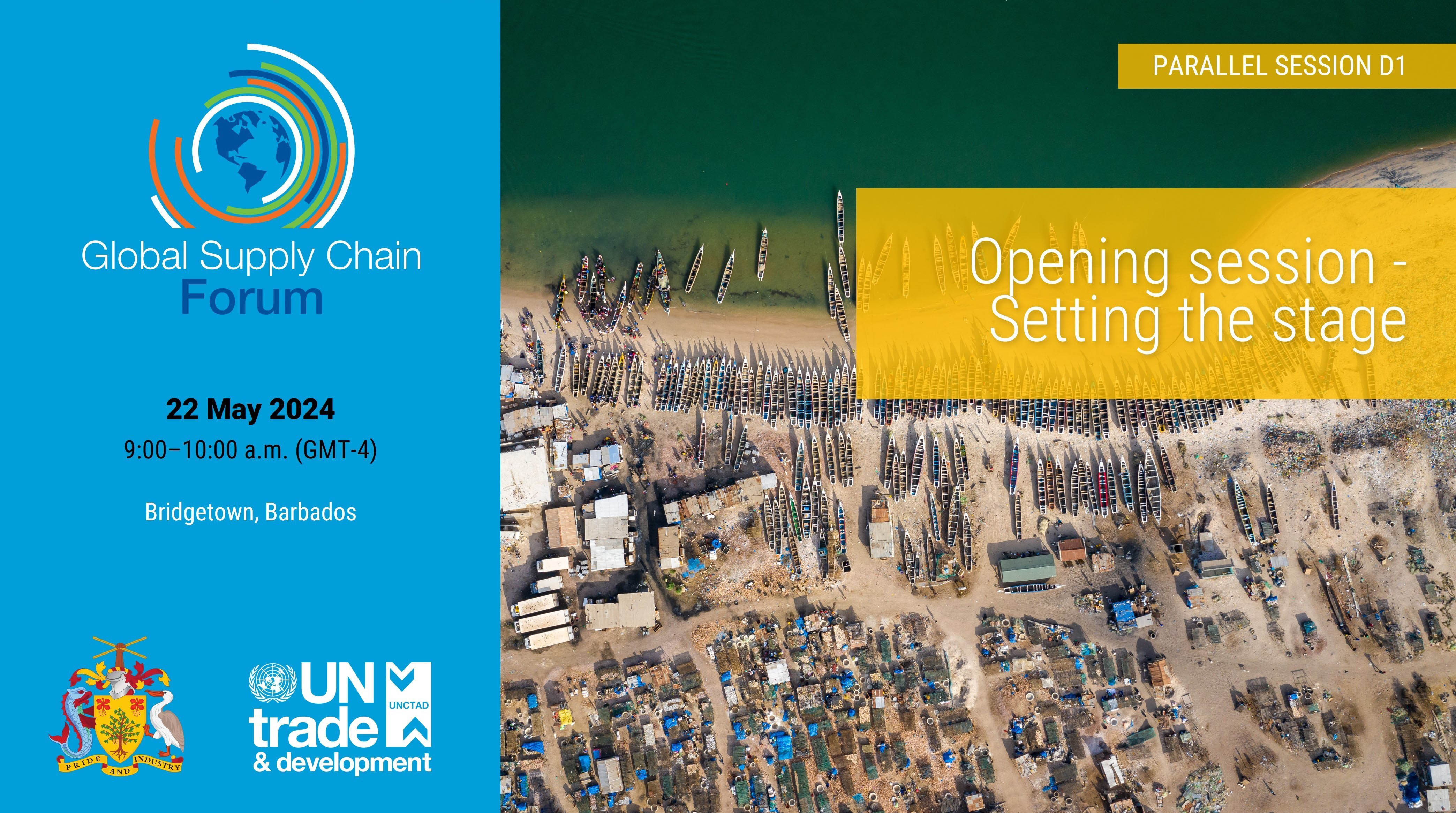Third Global Forum for National Trade Facilitation Committees (Opening Session)

Knowledge Graph of Debate
Session report
Full session report
Third Global Forum for National Trade Facilitation Committees focuses on enhancing global trade in post-COVID era
The third Global Forum for National Trade Facilitation Committees (NTFCs) was inaugurated with a focus on the critical function of NTFCs in enhancing global trade facilitation. The forum, which adopted a hybrid format to accommodate both in-person and virtual participation, represents a strategic shift to ensure inclusivity and engagement in the post-COVID-19 context.
Jan Hoffman, Head of Trade Logistics at UNCTAD, initiated the session by highlighting the essential nature of NTFCs, despite their seemingly mundane appearance as committees. He emphasized that these institutional mechanisms are crucial for uniting stakeholders from customs, trade, transport, and both public and private sectors to collaborate on trade facilitation measures. Hoffman also pointed out the importance of collaboration between organizations, as exemplified by the joint efforts of UNCTAD, the WTO, and other partners in trade facilitation.
Lisa Cummins, a Minister from the Government of Barbados, spoke about the government's role as an enabler and facilitator of trade, rather than a direct trader. She stressed that government regulations should facilitate business, not hinder it, and highlighted the importance of collaboration between government, the private sector, and international agencies. Minister Cummins also discussed Barbados' advancements in digital technology and innovation, such as the implementation of Asycuda World and maritime single windows, which can lead to efficiencies and new opportunities in markets like e-commerce. She called for the integration of green technology and innovation into trade processes to support the energy transition and tackle the climate crisis.
Ricardo Treviño Chapa, Deputy Secretary General of the WCO, discussed the WCO's role in assisting members by harmonizing standards and providing capacity building. He highlighted the WCO's tools and initiatives, such as the revised Kyoto Convention and the Safe Framework of Standards, which promote cooperation among customs, other border agencies, and the private sector. Chapa also emphasized the importance of private sector participation in trade facilitation efforts and the role of NTFCs as effective mechanisms for cooperation.
Mark Henderson, a project manager and trade negotiator at the WTO, shared insights on the WTO Trade Facilitation Agreement Facility's role in supporting TFA implementation. He outlined the various panels he would be participating in during the forum, which would explore challenges faced by NTFCs in areas such as donor coordination, humanitarian relief, and resource mobilisation.
José Raúl Perales, Deputy Director of the Global Alliance for Trade Facilitation, spoke as the voice of business and the private sector. He emphasized the shared responsibility between government authorities and the private sector in ensuring efficient and secure trade. Perales noted that the alliance works through NTFCs to bring agencies together and improve border management procedures.
Victoria Tuomisto, representing the ITC, characterized the panel as a global supply chain of trade facilitation co-creators. She highlighted the need for trade facilitation solutions to serve not just the big players but also micro and small businesses, women traders, and small-scale traders to improve food security and engage in cross-border trade safely.
Alina Monica Antoci from the World Bank Group discussed the Trade Facilitation Support Program, which provides technical assistance and capacity building to countries implementing the TFA. She underscored the World Bank's whole-of-government approach and the critical role of NTFCs in driving reforms at the national level.
Poul Hansen, Chief of Trade Facilitation at UNCTAD, concluded the session by encouraging active participation and discussion among the attendees. He reiterated the importance of coordination and collaboration in trade facilitation and urged the forum participants to question, learn, and contribute to the discussions.
In summary, the opening session of the third Global Forum for NTFCs underscored the pivotal role of NTFCs in trade facilitation, the necessity of collaboration among diverse stakeholders, the importance of digital innovation, and the challenges and opportunities faced by NTFCs in enhancing global supply chains. The forum serves as a platform for stakeholders to exchange ideas, share best practices, and forge partnerships to improve global trade facilitation processes.
Session transcript
Jan Hoffman:
Thank you very much, ladies and gentlemen, friends, colleagues. Welcome to the opening of the third Global Forum for National Trade Facilitation Committees, NTFCs. The first one we had in 2017 in Geneva with all our partners was a big event in Geneva. The second one, times of COVID, was online only. And this third one here, very happy to be in Barbados, is again in person, but with live streaming of some of the sessions. We have the possibility to stream some of the parallel sessions in this Global Supply Chain Forum. So the first three of this forum, then we have to go to another session. Then we come back with a closing, but very happy to have this after live and online. Here we have sort of a hybrid session. I'm your moderator for the session, Jan Hoffman, Head of Trade Logistics at UNCTAD. By way of introduction, three very quick thoughts. First, NTFCs, like National Trade Facilitation Committees, I confess it may not sound so exciting, a committee. If I tell my mother or grandmother, like, what are you working on? A committee, wow, another meeting. But there's no other way around. We must have some institutional mechanism where we get together. Customs, trade, transport, public, private, the users, the providers. So there are many measures in the WTO Trade Station Agreement. There are many measures in regional agreements that require collaboration. Be it a single window, coordination of working hours, be it authorized economic operators with mutual recognition. There are many, many measures that require collaboration for the NTFCs. My second point is then, as we preach collaboration on the ground and support collaboration, we thought it's not a bad idea if we set a good example and also collaborate among us, the organizations that represent and work with the different stakeholders. So I'm very, very happy here to be with you and will briefly introduce our panelists who will speak at this opening. We have Minister Cummins from Government of Barbados. We have the World Customs Organization, Ricardo, happy to have you here. So it's customs as a key stakeholder.Mark from the World Trade Organization, of course, very important. They've got a lot of impetus, of course, that we have the TFA at the WTO. I must say we at UNCTAD, we like to say we worked on this already much longer and earlier than the WTO. So we are happy you took it on board and really great collaboration. We have the Global Alliance for Trade Facilitation with Raul. Thank you also for joining. So that's a private sector represented here. We have international trade center with whom we have also worked many years on technical notes, implementation on the ground. The World Bank, Alina, decades going back working on APIs and logistics and really good to have you here. And last but not least, we have Poul Hansen from UNCTAD who is actually the leader of this preparation and will also say a few words. So that was my second point. And the third point is really just a big thank you. Thank you to the Government of Barbados for hosting the Global Supply Chain Forum and within the Global Supply Chain Forum also the forum for the NTFCs. Thank you for being here with us. And without any further ado, my role as moderator almost ends here. I will just then... Change my name plate for the one of Minister Cummings and give the floor to the minister. Thank you very much
Lisa Cummins:
Good morning to everyone and I'm very pleased to welcome all of you to Barbados first of all on behalf of the government of Barbados We are very pleased to have collaborated without tag to host this event this inaugural event here in Barbados And we are confident that on the basis of what we've seen so far of the last two days and your own Responses that not only has it been a success for the inaugural session But that we can expect that every successive session is going to be just as robustly supported as this one now I want to begin beyond the the question of Collaboration that was just raised by Jan in his opening comments and to speak about the importance of collaboration, but just International relationships. I mean we are joined on the stage by a distinguished panel representing not just persons who have worked on this But agencies that are collaborating and I want to tell you a little bit of a personal story that perhaps puts context so today in this moment I'm standing here and speaking to you as the minister with responsibility for the trade facilitation committee in Barbados but in a previous life I sat as the trade advisor to East Africa and Uganda On behalf of the Commonwealth Secretariat, and I remember one of my colleagues who's not Not in the room today, but based on who's our ambassador in Geneva We were sitting in the WTO and when the microphone opened and they gave Gave the floor to the delegate from Uganda. He said hang on it's not a Bajan accent And it was me, and I was speaking in the WTO on the trade facilitation negotiations as the representative of Uganda, supporting the East African community. And so here now, in a different incarnation, I've come back home almost full circle and taking responsibility. At that time, my colleague, Ambassador Wilson, today was a friend of the chair of the TF in the midst of those negotiations. And so I am very pleased to be here in Barbados, sharing space with him and with all of you and with UNCTAD and the WTO to welcome you to my homeland and to speak about collaboration. Now with that background, I want to focus my attention on three main things. The role being played or that role that must be played by governments, the agencies of government, the role that must be played by governments in partnership with international collaboration – international partners, and the role that must be played in collaboration with the private sector. Governments do not trade. Governments do not do business. But governments are enablers and facilitators, and that is the purpose and the intent of the trade facilitation agreement. And if government regulations and government democracy stand in the way of the ease of doing business and the facilitation of trade, then we're not doing our jobs and we're not doing it well. So I want, first of all, to start with the role of government. In a previous life as well, I happen to have been the chairman of the Bridgetown Port. And the Bridgetown Port is the space through which we import 90 percent of all goods into the country. If we do so efficiently, if we are able to reduce the cost of doing business as we trade across borders, to use the mechanisms that have been developed by partners like the World Customs Organization, represented here today, we had the opportunity in 2019, September, the Comptroller of Customs and I, to chair a very painful process of introducing Assecuta World into Canada. the Bridgetown Port and into the government of Barbados. And we, at that time, spent a lot of time focusing on how government could do what we had to do better. How could we protect the borders? How could we ensure the collection of revenue for the state? How could we protect the borders from allowing contraband and illicit materials from coming into the country? And simultaneously, how could we facilitate the business community? And that work was substantial, and it has continued, and it led, at the time, to the creation of an entity which still exists called the Port Efficiency Subcommittee. And that committee, called a committee, nonetheless, that committee constitutes that collaboration that I'm speaking about. It constitutes government. It constitutes the private sector. Because if you're not sitting in the midst of it, and you don't understand what it means to have that document that may be sitting on your desk, moving off of your desk, in order to facilitate trade, and then how that connects to the increase in prices at the retail level, and the overall cost of living in the country, then you're not doing your job. And so we want to make sure that governments are collaborating to ensure that we have the systems in place. Here in Barbados, we have the Asakusa World introduced in 2019, as I've mentioned. We have the Port Community System, which is in development. The Bridgetown Port has already introduced in-house the maritime single window, in collaboration with the International Maritime Organization. And under my own ministry, we are in the stage of preparing, tomorrow, to launch the first exchange under the electronic single window for trade. And so we have all four portals currently functioning in Barbados, and we are going to be moving to make sure that they're integrated. But then what comes next? What comes next, from our perspective, is the collaboration with international agencies. And I want to take the opportunity to make the call here, today, for us to work far more closely with the WTO, with UNCTAD, with the WCO, to ensure that we're able to meet the regulatory requirements of the Trade Facilitation Agreement. That we're also able to live up to the requirements of government but that we are able to go beyond that. How do we integrate digital technology? How do we integrate innovation? How do we ensure that the ease of doing business then leads itself to opportunities in areas like e-commerce? That then set the stage for a transformation in the business climate. I'm Minister of Business as well so I can't not say that. And then how do we also, as Barbados in this instance, with a Prime Minister who is the face and the voice of the climate crisis, not make all of that work green? How do we integrate green technology, green innovation? And as a Minister of Energy as well, I'm beginning to think that I'm overworked and underpaid. But how do we integrate green technology and to facilitate the energy transition into the work that we do? And then I want to close because I want to make sure I have room for my colleagues to have a conversation. I want to close on a role to be played by the private sector. We in Barbados tend to focus very heavily on post-clearance inspection. We have a risk assessment which is approximately 80% green, 20% red. So we send everything to the consignees typically and then we inspect on site and then we audit after the fact. But here's what I want us to be able to rationalize. Different countries and different regions function in different ways. And in the Caribbean region, if we're shipping intra-regionally, it's less than 24 hours from one port to the other. And it means that pre-clearance makes it very difficult to be done if you're not using the digital technologies. And so the Caribbean region, the Pacific region, the European region all have different dynamics. And there has to be those regional nuances that integrate the work of the trade facilitation committees, the work of governments, and to facilitate how the private sector does business. I hope that we have an opportunity to talk more about all of these things as the day progresses and as the session here progresses. But I want to pledge the support of the government of Barbados and my own ministry and my own team to working far more closely through our mission in Geneva and through the agencies with whom we have built a longstanding familial relationship. Thank you very much.
Jan Hoffman:
Yes, thank you very much, Senator Lisa Cummins, Minister of, as you said, energy and business and many other things. Very happy to give the floor now to Ricardo Treviño Chapa, Deputy Secretary General of the World Customs Organization. Bienvenido. Gracias.
Ricardo Treviño Chapa:
Thank you, Jan, and good morning to everyone. I would like to start again by thanking once more the Barbados government for hosting us today. Last night, it was a brilliant reception at the residence of the Prime Minister. We had a very good time, Minister, and we thank you. We thank the government and the people of Barbados for this warm welcoming here in your beautiful country. Thank you very much. And thank you, UNCTAD, again, for this organization and this coordination and invitation to this event. As I mentioned yesterday, the WCO, it's an organization 100% focused on customs matters. We are over 70 years old. We have 186 members covering 99% of trade, basically. And yesterday, I was talking about the challenges that we have in the supply chain, and I mentioned that a specific aspect of overcoming these challenges was through cooperation, cooperation at the level of customs to customs, cooperation at the level of customs with other border agencies, and cooperation with the private sector. And I think this session very much touches upon A very concrete tool, a specific initiative that really performs under these lines and these objectives of cooperation. As we all know, customs has a multitask and multi-objective purpose. We contribute to protection of society by mitigating the risk of counterfeit and illegal goods. We also contribute to a fair revenue collection. And of course, thirdly, we also contribute to economic growth by facilitating legal trade. And the WCO assists our members in these objectives through basically setting standards on the one hand and building capacity, all of this in a framework of strong, close cooperation with our partners, stakeholders, and with our own members. So in this regard, when we talk about trade facilitation and when we talk about how WCO assists members by harmonizing and by setting international standards, of course, we have to talk about some of our main tools, like the revised Kyoto Convention, which basically consolidates most of the best practices in facilitating trade. We have, of course, the Safe Framework of Standards, which goes towards the security and facilitation and transparency of the supply chain. And of course, the specific guidance that was published on the establishment of the National Trade Facilitation Committees, the NTFCs. among other other tools. But when we as WCO agree and publish these standards among our 186 members there are different capabilities and there are different sometimes different national strategies with different purposes and therefore WCO provides technical assistance and training and builds capacity for our members to properly implement these standards. In this sense we under our technical assistance and capacity building support we have several programs several initiatives I want to highlight at least two today the one with our partners UNCTAD and HMRC which is the accelerated trade facilitation program so this program is focusing in trade facilitation in our members and the second one is the second WCO global trade facilitation program which also the first one is funded by the UK put the second one by Switzerland and therefore these partners allows us as WCO to promote and to build capacity of our members for the correct implementation on standards. We also have several e-learning programs on our platform and in this case we also promote the private sector participation so these e-learning programs are not only focused to customs administrations they're also focused to other border agencies and they're also focused in incorporating the private sector into these efforts of cooperation and this is an important one and I must echo our minister in the important participation of the private sector in these efforts. We are on the same boat. I think everyone in society wants legal trade to flow. We want economic growth. We want to protect our families, our societies. Therefore, we must build trust. We must build trust between authorities, border authorities, and the private sector. And a way to build trust is by establishing these national trade facilitation committees. This, again, it might sound boring to say a committee, but it is effective. It is effective, and it's a mechanism that really drives us closer in cooperation, in collaboration, with a multi-stakeholder purpose, with other border agencies, and with the private sector. And therefore, it's something that together with UNCTAD, WCO, is strongly supporting with our members, customs administrations. And just to close on this aspect, I would like to briefly mention a few challenges and specific issues that we have identified through our capacity building programs, in which we have to focus efforts for the NTFCs to be efficient and productive. We have identified as best practices that we have to implement, and we have to define concrete plans and roadmaps. We have to have high-level political support and involvement in these committees. We have to successfully integrate the participation of private sector. We have to also establish a way to measure performance of these national committees. And of course, we need to incentivize and foster intensive use of technology for this cooperation. So these are just some high-level principles, mentions that we have identified together with our members, and that we're definitely gonna keep promoting. And I know that throughout the day in this session, we will keep hearing about it and hearing in more detail some of the experiences and success stories around the world. So again, thank you for this organization. And Jan, the floor back to you. Thank you very much. Have a good day.
Jan Hoffman:
Yes, thank you very much, Ricardo, and that does remind me that I really want to include our partners from the United Kingdom, who long ago, to some extent, forced us to collaborate between UN Trade and Development and WTO, and most of us did it very happily. And we still continue this collaboration. So thank you, UK, for the support, the collaboration. It's actually also not only the funding, but also working together with custom specialists from the UK in this particular joint program. Third on our list for the opening is our friend Mark Henderson, project manager and trade negotiator at the WTO. Mark, please.
Mark Henderson:
Senator, esteemed colleagues, ladies and gentlemen, I'd like to add my sincere thanks to the government of Barbados for hosting us here on this beautiful island, and to the team at the UN Trade and Development who've done a huge amount to make the forum happen. And we very much appreciate the opportunity to share the position on the panel with such esteemed speakers and have the opportunity to share our message. So I'm here to speak to you on behalf of the WTO Trade Facilitation Agreement Facility, which exists to support the development aspect of TFA implementation. We seek to improve access to assistance and capacity building, which is so necessary for many members to implement the agreement. We provide implementation grants when gaps are identified. And we seek to build capacities to engage with development partners, including those on the panel and those here in the room. We also seek, importantly, to align the efforts with the WTO Committee on Trade Facilitation, and I'll speak more to that. For all of these efforts, National Trade Facilitation Committees are an absolutely essential partner for us. As Jan pointed out, the work is utterly essential, no matter whether it's exciting or catches the eye of your grandmother, it's necessary for us. So I wanted to share with you some of the things that I'm involved in this week to give you an understanding of our focus and what we pay attention to. Yesterday I met with a number of CARICOM members, many of whom I see in the room, and they were subject experts on trade facilitation, to develop and finalise plans for TFA implementation projects. So the real concrete day-to-day work of implementing the agreement and supporting members' efforts to do so. Immediately after this opening, I'm speaking on the next panel on successful NTFCs and the best practices, challenges and opportunities. This afternoon, I'm moderating a panel on humanitarian relief, the role and preparedness of the NTFCs. And then tomorrow, finally, on a panel on the role of NTFCs in mobilising resources for trade facilitation reforms. Now I mention all of this, first of all, to give you a warning that you may get sick of hearing my voice, and second of all, to give you an idea of what we see as some of the priorities for the NTFCs. You heard a diverse range of topics there. All must be delivered through those committees. So, those priorities to act as the hub and institutional memory of TFA implementation. Coordination of TFA implementation across government and across borders and with the various institutions that are speaking today. Donor coordination and engagement of the technical assistance necessary. Now, these are big roles to fill, big expectations for a committee. We know that not all NTFCs are established, structured or funded in a way that enables them to deliver on these roles without encountering challenges. In each of my interventions in the coming days, I'll seek to explore these challenges through the thematic lens of each of the panels. I'll share what the TFAF has learned through its interactions with WTO members in Geneva and in capitals. And I also hope to prompt your suggestions on how we can support these roles to inform our work, including through our reports to the WTO Committee on Trade Facilitation, working with partners represented by my colleagues on the panel here to identify implementation support for members' Category C needs, working with members to develop and launch implementation solutions when no other support is available, engaging with donors and development partners to report on emerging trends and the challenges that members are facing, and importantly, fostering south-south support between peers. The expertise is out there. I observed this yesterday. I observe it whenever I travel to participate in meetings in capital. There is a lot of expertise and understanding, and we'll seek to support that and try to unlock the exchange of knowledge. of information and expertise. With that, I'd like to thank you for your attention, and I look forward to working with you all over the coming sessions. Thank you very much. Jan, back to you.
Jan Hoffman:
Yeah, no, thank you very much, Mark, and yeah, really long-term working together with the WTO and, yeah, to help implement the TFA and also during the negotiations, UN Trade and Development and the Annex D partners were, I think, instrumental in actually coming to that agreement. So, next on the list is Raúl, José Raúl Perales, Deputy Director of the Global Alliance for Trade Foundation. Please, Raúl.
José Raúl Perales:
Good morning, everybody. Thank you very much for being here, ladies and gentlemen, excellencies, distinguished authorities and guests, colleagues. It's a great pleasure to be here in Barbados after a 10-year absence. As a son of the Caribbean, it always feels great to be back in these waters and enjoy the camaraderie, the warmth, and the hospitality of this beautiful country. And it's also a delight here to be speaking as the voice of business and the private sector as the counterpart on these conversations. For those of you who don't know it, the Global Alliance for Trade Facilitation is the world's only public-private partnership designed to support implementation of the TFA, but also trade facilitation reforms in a broad spectrum. We have three host organizations and three headquarters, if you wish, in Geneva, Paris, and Washington, supported by a range of governments and 41 multinational companies whose expertise and talents and capabilities we leverage. to build projects and reforms based on the user experience. So our approach to these reforms is not just to advance the goals of the countries that have made commitments under the TFA and the various categories, but also to build things from the bottom up, to bring that user experience into how many of these processes are perceived, and then find the intersection in which governments and business can work together to build lasting and sustainable solutions. So for the Global Alliance, as I said, for trade facilitation, it's an honor to be joining the third forum of NTFCs. The alliance was founded on the principles that efficient and secure trade are a shared responsibility between government authorities and the private sector, that this responsibility is best carried out through institutional vehicles that are transparent, predictable, and accountable, and that trading across borders is a right, not a privilege of the few. As a private sector vehicle for trade facilitation reforms, we believe strong national trade facilitation committees truly embody these principles of our practice. And it is for this reason that whenever possible, the alliance works through the NTFCs as we seek to bring agencies together to share data, to reform business processes, and improve the effectiveness of border management procedures. Already, our work has become part of the agenda of three NTFCs in Ecuador, Zambia, and Colombia, places which, not coincidentally, is where our efforts have advanced the furthest. So again, I want to commend UNCTAD for organizing this important forum. And I want to encourage all of you here to use the next two days to imagine the potential that exists in our NTFCs if we truly bring the private sector and governments together as real partners. each with their strengths, perspectives and resources to develop efficient, accessible and sustainable cross-border train. Thank you very much.
Jan Hoffman:
Thank you, Raul. Next on our list is the ITC, sometimes the daughter, the son, the two parents, are the WTO and UN Trade and Development, or the UN. So very happy to have this case, it's fair to say, the daughter, Victoria, with us. Please.
Victoria Tuomisto:
Thank you, Father Jan. Esteemed colleagues, panelists, esteemed ladies and gentlemen, thank you very much for this opportunity. On behalf of the whole of ITC, let me extend our sincere thanks and congratulations to the government of Barbados, to the people of Barbados and UN Trade and Development for organizing this event and for the exceptionally warm welcome to us all. Now, one of the ways I would characterize this panel, and I will steal from the title, is an international or global supply chain of trade facilitation co-creators, helping or hoping to serve through its different focus areas, regional strengths, features, in the production of trade facilitation solutions for all, in service of the end consumer, the business, the people, really aiming to live a decent everyday life. So I was really struck yesterday by the very compelling speeches, notably by the Prime Minister of Barbados, about characterizing the forum as the people's forum and really asking some fundamental questions, right, about what global supply chains are for. Who are they for? What is their purpose? And those same questions really apply to trade facilitation. That's what we see in our everyday life. And sure, we can describe trade facilitation as reducing time and cost of trade, but what are we doing? We're providing, aiming to provide digital solutions for trade, to power the next generation of businesses, for young people to take part of opportunities in exporting and importing. It's to help women to be able to engage in cross-border trade, small-scale traders to trade safely across borders, and improve food security, like we heard yesterday, both in terms of fragile areas, but also fragile times and periods. So at ITC, we really center our focus on the micro and small businesses. And the truth of the matter, in terms of all the work that we do, is that yes, when everybody is involved, but large actors lead the way, very often the trade facilitation solutions will serve the big players. But when small business is included, that usually serves everybody. And the same goes when we include women traders and the whole picture of the community. The impact is seen across the board in the whole trading community and society. So, with those challenges in mind, of course, we heard yesterday about the impetus of responding to the climate change challenge that is facing us all. And the drive for those solutions are mainly digital, they're urgent, they need to be sustainable, and they only intensify the need for collaboration beyond perhaps the traditional trade facilitation communities. And so with all of these challenges, I would say that the role of the national trade facilitation communities is really the role of evolving and changing rapidly. And there are new urgent objectives to be met, which requires new work streams, new structures, new actors, new types of collaboration. And so the agenda of the NTFC forum and the NTFCs, I believe, is very full, could not be busier, and therefore the timing of our forum really could not be timelier. I think the same goes for the supply chain characterized on the panel. ITC is part of a mini supply chain of its own, as part of the UNCTAD and WTO family. We aim to embody this spirit, and we want to thank all the partners present here in the work that we've conducted on digitizing, simplifying procedures, notably with UNCTAD, on applying risk management principles from a wider perspective that we've done with UNCFACT, UNECE, and all the partners that we've worked with on a host of different trade facilitation solutions over the years. So with that, I would also then urge the participants to really take the opportunity and the time at this forum to find those collaborations, new partnerships, beyond traditional partners in trade facilitation, with the civil society, with investors, with NGOs, with academia, with all of those represented here, to really meet the new urgent objectives of the NTFCs. So with that, I would like to thank you for the time, for the excellent organizing of this event, and look forward to productive discussions over the next two days. Thank you.
Jan Hoffman:
Yes, thank you very much, Victoria. You must have been happy also about the winner of the innovation challenge, no? You are so happy how she was so happy with the idea, a young woman, you saw her yesterday, who first time in her life outside Africa, and very much ticked all the boxes, her proposal for the women, for the cross-border, for the SMEs. So that is very much your topic. Next is here on the list Alina,Alina Monica Antoci, Senior Private Sector Development Specialist. at the World Bank. Alina, thank you.
Alina Monica Antoci:
Well, first of all, good morning, everyone. It's good to be here, my first time in Barbados. And I would like to take the opportunity to thank you again, the organizers, for putting together this very important and critical event. And also for our hosts to be such gracefully allowing us to spend time here and share our experiences in these important topics. So I represent the World Bank Group. The World Bank Group, as many of you may know, it's the largest provider of technical assistance capacity building around implementation of the TFA. Of course, we don't do this by ourselves. We do this through a program which was developed as a global response to address trade facilitation implementation issues. It's called the Trade Facilitation Support Program. The program was launched in 2014. And currently we are having projects in about 70 or so countries, many of which I am personally involved in. We are also funded by nine donor partners, Australia, Canada, European Union, Netherlands, Norway, Sweden, Switzerland, UK, and the USA. And most importantly, we do this with, again, collaboration with our international partners, many of which are here on the podium, and some of them will be presenting during the various interesting sessions of this conference. So we'd like to thank them for that. Of course, we do many projects together with the UN Trade and Development in implementing – we support implementation of the ASICURA program, National Trade Facilitation Committees, risk management, and the like. So, really, for us at the World Bank, the Trade Facilitation Support Program, again, it's a rapid response program of technical assistance capacity building. We are also at the World Bank Group a bit in a more privileged, I would say, position to also be able to provide long-term assistance. We have many other financing mechanisms that, after the technical assistance capacity building has reached a momentum where addressing more complex issues are there, we come in and we provide loans or development policy operations to support more complex initiatives, implementation of the national single window being one of the most costly TFA measures to implement. So we partner with countries on different angles, first as a rapid response through the TFSP. We provide technical assistance to countries to reform those trade facilitation laws, procedures, processes, and systems to align themselves with the international best practice that the TFA provides. So what we do at the World Bank, I think, which has gradually evolved since I joined the World Bank many years ago now, is to take a whole-of-government approach. We want to make sure that everybody is at the table. And in fact, it always reminds me, I was once at a conference where they gave everybody a bracelet that said, you are part of the solution. You know, it was a very simple message, but very powerful. It just says that everybody needs to be at the table for a successful reform to take place. And sometimes, those are the most challenging things that we deal with in implementing the TFA and other measures that are perhaps more complex, is to bring people together. and give a reason why we need to implement these measures. Why is it important? Is it important to have an NTFC just to have one? Or perhaps the NTFC has a very critical role to drive that reform at the national level. And I also compare it here because we're on an island economy with the rudder, the very small thing at the end of the boat that helps steer the boat, helps keep it straight or take turns. Now, of course, the boat is much, much bigger than the rudder. But the morale here is that if you put enough good pressure and consistent pressure in the right way, you can actually produce that exponential influence on the much larger body. So the NTFC sometimes are seen in this way, or that's the way I see them. They do have that power to steer and to keep the message straight if they stay engaged and if they stay consistent in their messaging and in their approach. So for us at the World Bank, of course, taking the whole of a government approach involving all the border management agencies, beginning, of course, with customs, the most visible agency at the border has been key. We have some building blocks in the work we do. We undertake, first of all, a gap assessment in a country to see where the alignment with the WTO TFA is. We identify categories that need to be communicated to the WTO. We help with those notification of commitments, of measures. And finally, we put together reform priorities in an action plan that then is being implemented at the national level. And I think most importantly, we deliver results. So since the program has started in 2014, we supported about 34 national trade facilitation committees around the world. We helped increase alignment with the WTO TFA by 51% on average. We undertook 50-plus gap assessments for the implementation of the Trade Facilitation Agreement. And these are the basis of where the reform starts. It informs the National Trade Facilitation Committee and client governments on what are their priorities going forward. We also supported more complex initiatives such as implementation of the Trade Information Portals. We just launched our last one in Timor-Leste in April. So we have now about 12 of these initiatives being implemented. We also implemented about 10 national single windows around the world, sometimes in a regional initiative, sometimes in a light version, like we have an example in Lesotho. We implemented 11 AEOs, Authorized Economic Programs. And also we supported more than eight, I would say right now, I don't have the latest number, trade and gender surveys. We heard also the minister and others here this morning mentioning the role of women-led traders that actually will play an important role. So we have taken these surveys in a number of countries and we are now in the process of including those recommendations or some of the recommendations in the action plan for the National Trade Facilitation Committees. So perhaps I will stop here. I will just say take this conference as an open discussion. Come and talk to us. Reach out to us, all of us here. We are a rich resource of information and we're very happy to talk to you. Thank you very much.
Jan Hoffman:
Thank you, Alina, and that reminded me some of the examples you gave, very little. story where your colleague, boss Bill and I were sitting in my office in Geneva and discussing potential for collaboration and while we spoke, both of us, not very polite, we are also checking our emails like what you do these days, all the time checking and we both received the same email from a country asking for the same thing so we looked at each other and said let's work together I think, is Lazar in the room still? we ended up working together and I don't know who at that time paid your salary whether World Bank or UN trade and development but we worked in that country yes I was trying to be polite not to mention country names it was so to me but this is, I'm sharing this here as an example yes we do want to collaborate we do think, especially the World Bank, there could be potential for more even more collaboration but it is also you, the member countries that have the responsibility to coordinate in your country and not just do shopping and ask everybody the same which would then be duplication last but not least, Paul Hansen, chief of trade association he is the one who put this together with this amazing team whom you see here in the room so I will basically conclude my role as moderator here and we are good in our timingPoul you will say some opening words and I think then you will take over and moderate and lead to the next practical session so I thank you all, I thank the minister, all the partners for this opening and hand over to Poul , thank you all
Poul Hansen:
Thank you very much Jan, minister, colleagues, participants, good morning and actually I haven't done anything, it's my amazing colleagues that have done everything Thank you very much, all of you, for being here, especially those of you that are from national trade facilitation committees or from regional trade facilitation committees, which are also important. This forum, these two days, these are for you, and we hope that you will contribute actively in this. John mentioned that in 2017 we had the first global trade facilitation forum, and actually my picture on the screen is from that event. I know, much younger and much lighter. But it's not so much my picture on this that's important, but it's the background, because the background exactly showcases that we have been collaborating for quite some time. We are still collaborating with all the colleagues and the organizations that are on the scene here. Actually, one colleague asked me, Paul, why are you using this photo? The UNCTAD logo, as we were then, is not on there, really. It's WCO, ITC, but that's not the issue. The issue is that we collaborate on trade facilitation implementation. We partner with countries and with organizations and with the business sector in order to implement the best possible outcome on trade facilitation. So I think this is really the spirit of this forum and the spirit of these two days. So I'm very happy to be here. I'm very happy to be back in Barbados. Thank you very much for your hospitality. So it's about partnership. And it's about what we can help with, what we can assist with, how we can partner. We are here to learn, all of us. We are here to pass on what we have learned. Because, by ourselves, it is not our invention trade facilitation. We see good practices around the world, and we are here to pass on many of these. Have discussions. How do these solutions work in the best possible way for national trade facilitation implementation? So please, as others have said, use this event to discuss amongst yourself, to discuss with you, with us, how trade facilitation can be implemented most efficiently. National trade facilitation committees, regional trade facilitation committees, are therefore as coordination bodies. And coordination is not easy at all. I always say everybody talks about coordination, everybody agrees about coordination, but nobody wants to be coordinated at the end of the day. So it is a difficult role, but it's an important role. We talk about many other solutions in trade facilitation. But if it is not coordinated, it is very difficult to move ahead. So this is a crucial role. You have a crucial role to play in collaborating. So use this opportunity to question those that are speaking. Question each other, learn from each other. The issues have already been outlined very well, I think. Lisa mentioned a number of the issues that they have gone through. Mark mentioned a number of the issues. And it shows the wide variety of issues that national trade facilitations can be involved in. Some were probably not envisaged in the WTO TFA when it was agreed, but it shows that there can be so many roles for the National Trade Facilitation Committee and that it evolves. So you can also, I think... Take home some lessons on what is it that your National Trade Facilitation Committees could do. So thank you very much for being here. I really look forward to these next two days on this, and I think this is the room you want to be in over the next two days. We started with a fantastic party last night, and we will have a fantastic party in this room over the next two days. So I really look forward to hear your views, your opinions. Don't hold back. Please contribute. This is the way that we all learn the most and get most out of this event. So I wish you a successful event, and as Jan handed over already, I take this opportunity then to end this session, and we will start the next session in about seven minutes. So thank you very much and welcome to this forum.
Speakers

Alina Monica Antoci
Speech speed
150 words per minute
Speech length
1195 words
Speech time
477 secs
JH
Jan Hoffman
Speech speed
148 words per minute
Speech length
1366 words
Speech time
552 secs

José Raúl Perales
Speech speed
160 words per minute
Speech length
520 words
Speech time
195 secs
LC
Lisa Cummins
Speech speed
194 words per minute
Speech length
1489 words
Speech time
459 secs

Mark Henderson
Speech speed
145 words per minute
Speech length
759 words
Speech time
314 secs

Poul Hansen
Speech speed
142 words per minute
Speech length
777 words
Speech time
328 secs

Ricardo Treviño Chapa
Speech speed
130 words per minute
Speech length
1022 words
Speech time
470 secs

Victoria Tuomisto
Speech speed
173 words per minute
Speech length
757 words
Speech time
263 secs
Opening of the meeting by UNCTAD, followed by welcome remarks.
Introduction of the agenda and the keynote speakers for the next 2 days.
Moderating of the panels and a question-and-answer session.
Programme
Moderator:
- Jan Hoffmann, Head, Trade Logistics Branch, Division on Technology and Logistics, UNCTAD
Speakers:
- Lisa Cummins, Minister of Energy and Business, Barbados
- Ricardo Treviño Chapa, Deputy Secretary General, World Customs Organization (WCO)
- José Raúl Perales, Deputy Director, Global Alliance for Trade Facilitation (GATF)
- Victoria Tuomisto, Trade Facilitation Adviser, International Trade Centre (ITC)
- Alina Monica Antoci, Senior Private Sector Specialist, World Bank Group (WBG)
- Mark Henderson, Project Manager and Trade Negotiator, World Trade Organization (WTO)
- Poul Hansen, Chief, Trade Facilitation Section, UNCTAD

Jan joined UNCTAD in 2003 and is Chief of the organization’s Trade Logistics Branch since 2016. The Branch implements research and technical assistance programmes in international transport and trade facilitation.
Previously, Jan worked six years for the UN ECLAC in Santiago de Chile, and two years for the IMO in London and Santiago.
Prior to this, he held part time positions as assistant professor, import-export agent, and seafarer. Jan has studied in Germany, UK, and Spain, and holds a PhD in Economics from the University of Hamburg.
With a public sector career spanning over 20 years, he held several positions within the Mexican Government. In 2015 he was appointed as General Administrator of Customs by the President of Mexico, with ratification by the Senate. During his tenure, Mr. Treviño Chapa promoted digitalization of Customs procedures as well as cooperation with other border agencies and with the Customs administrations of Mexico's main trading partners.
Since January 2018, after being elected and re-elected in 2022 by the WCO Council, Ricardo Treviño Chapa has held the post of Deputy Secretary General. During this time he has driven an important change in the Organization through the definition and implementation of the Strategic Plans 2019-2022 and 2022-2025.
He is now leading the process to define a Modernization Plan, which is an ambitious process to reform WCO governance and accountability to adapt to current global realities and emerging Customs needs.
José Raúl Perales is Deputy Director of the Global Alliance for Trade Facilitation where he oversees a team involved in the design and implementation of all in-country projects.
Raúl previously served as the Assistant Secretary for the Private Sector at the U.S. Department of Homeland Security. In this role, Perales advised the Secretary on the impact of the Department's policies, regulations, and processes on private sector companies.
Raúl has also served as the Director for the Americas at the U.S. Chamber of Commerce, held roles at the Association of American Chambers of Commerce in Latin America and the Wilson Center, and served as trade policy adviser to the government of Puerto Rico.

Alina Monica Antoci, Senior Private Sector Specialist at the World Bank Group's Trade, Investment, and Competitiveness Global Practice since 2004, led the "Logistics Performance Indicators" project for the "Connecting to Compete - Trade logistics in the global economy" reports.
She authored the "Trade and Transport Facilitation Assessment - A Practical Guide for Country Implementation" and contributed to publications like the World Economic Forum's Global Enabling Trade Report and the World Bank Group "Border Management Modernization."
Currently, she co-leads a book on trade facilitation trends, contributes to high-level policy dialogues, and leads operational implementation of projects in Trade Facilitation, Border Management, and Customs Modernization across 70 countries.
Previously at Harvard, the European Commission, and the Romanian Ministry of Finance, she holds a Master's in Mathematics and Information Technology, a Certificate in International Tax Policy and Administration from Harvard Law School, and a Master's in Public Administration from Harvard University's Kennedy School of Government.
Victoria Tuomisto is a trade facilitation and policy adviser at the International Trade Centre. Since 2016, she has conducted ITC's technical assistance programmes towards the implementation of trade facilitation and policy reforms, notably the WTO Trade Facilitation Agreement, in Africa and Asia, with a focus on regional integration. Victoria also manages the editorial development of ITC's trade facilitation and policy for business section.
Prior to joining ITC, Victoria worked as an editor and analyst for The Economist Group, where she managed research projects on industry, economics and business topics as well as forecasting for emerging markets across Europe, the Middle East and Africa. She holds an MSc in Political Economy and a BSc in Economic History from the London School of Economics.

Poul Hansen is responsible for the Trade Facilitation portfolio at the United Nations Conference on Trade and Development (UNCTAD).
Poul has extensive experience in the area of trade and transport facilitation, having worked for more than 20 years in the UN system on issues such as international trade, transportation, transit, development, international standards, previously working at the UNECE as Secretary for the TIR and International Harmonization Conventions etc.
Prior to joining the UN, Poul worked for more than 10 years in the private sector in public affairs, management consulting and logistics, including with Ernst & Young. Poul has studied both master and bachelor levels in Business Administration and International Law from the Aarhus University and Copenhagen Business School, Denmark.
Poul is a certified freight forwarding agent.
Mark Henderson is a project manager and trade negotiator with 15 years' experience working with and for WTO, European Commission and the Chinese government. Since August 2018 he has worked to support developing and LDC Members with Trade Facilitation Agreement implementation at the WTO Secretariat.
During his tenure at the European Commission's Directorate General for Trade, Mark led negotiations that integrated the Paris Agreement into the Japan EU Economic Partnership Agreement, pioneering climate change considerations in major trade deals. He also contributed to shaping the EU's trade strategy within UN Sustainable Development Goal negotiations and supported the EU's chief negotiator during UNCTAD XIV in Nairobi.
Mark has managed teams delivering global projects, conducting numerous training sessions, seminars, and conferences across three continents. His work convened international stakeholders from business, politics, and the judiciary to discuss critical topics such as trade facilitation, environmental sustainability, regulatory reform, and competition policy within WTO Membership.






